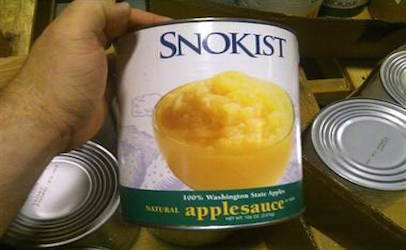In 2011, when applesauce from Snokist was making children sick as far away as North Carolina, USDA Agricultural Marketing Services local inspector Wendy Alguard told Food and Drug Administration (FDA) investigators arriving on the scene in Yakima, WA, about the problem. She thought FDA ought to know that Snokist employees often had to scrape mold from bins of older applesauce and mix it in with new product. Snokist at the time was an applesauce supplier to the National School Lunch Program, and FDA quickly determined the company was repackaging applesauce containing potentially dangerous mold. The agency put Snokist on notice that foodborne molds may be hazardous to human health because of their ability to produce toxic metabolites produced from the mold.  USDA was embarrassed (again) for its management of the NSLP. Snokist went into bankruptcy and no longer exists. Alguard lost her local job. She soon learned that her continued employment with USDA would require a transfer from Yakima, WA, to somewhere in California. She suspected the reason that she could no longer be employed in Yakima was that USDA was retaliating against her for being a whistleblower due to her reporting the mold problem to FDA. She then sued in federal court for the Eastern District of Washington State. But U.S. District Court Judge Thomas Rice did not see it that way. Rice has ruled against Alguard, finding that the USDA Agricultural Marketing Service was overstaffed in the Yakima area, especially after Snokist went out of business, and that the transfer offer to California was proper. Rice said that sufficient evidence exists “that the agency’s motivation to retaliate was relatively weak, and that the evidence showed the agency did not treat plaintiff differently than other similarly situated non-whistleblower employees.”
USDA was embarrassed (again) for its management of the NSLP. Snokist went into bankruptcy and no longer exists. Alguard lost her local job. She soon learned that her continued employment with USDA would require a transfer from Yakima, WA, to somewhere in California. She suspected the reason that she could no longer be employed in Yakima was that USDA was retaliating against her for being a whistleblower due to her reporting the mold problem to FDA. She then sued in federal court for the Eastern District of Washington State. But U.S. District Court Judge Thomas Rice did not see it that way. Rice has ruled against Alguard, finding that the USDA Agricultural Marketing Service was overstaffed in the Yakima area, especially after Snokist went out of business, and that the transfer offer to California was proper. Rice said that sufficient evidence exists “that the agency’s motivation to retaliate was relatively weak, and that the evidence showed the agency did not treat plaintiff differently than other similarly situated non-whistleblower employees.”
(To sign up for a free subscription to Food Safety News, click here.)
